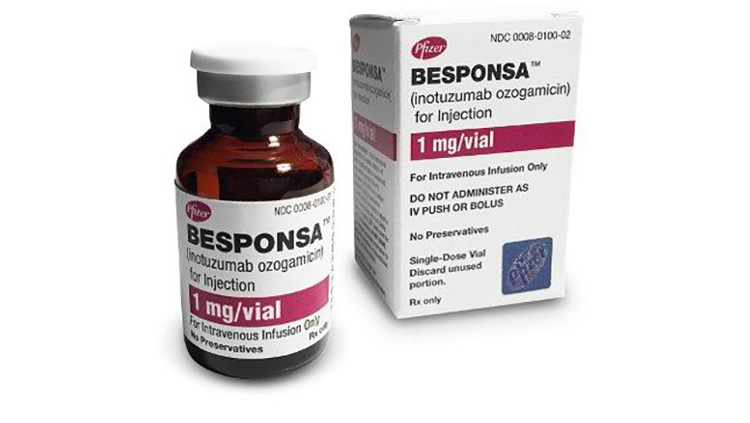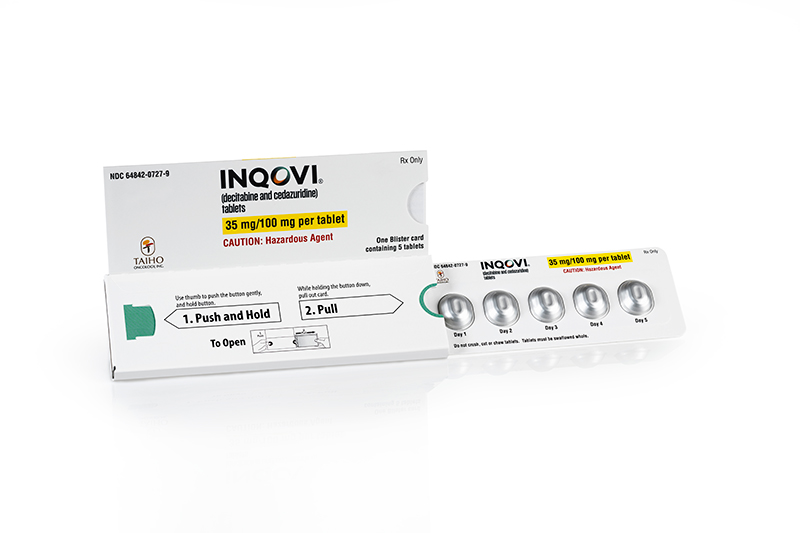Besponsa (inotuzumab ozogamicin) vs Inqovi (decitabine and cedazuridine)
Besponsa (inotuzumab ozogamicin) vs Inqovi (decitabine and cedazuridine)
Besponsa (inotuzumab ozogamicin) is an antibody-drug conjugate specifically indicated for the treatment of adults with relapsed or refractory B-cell precursor acute lymphoblastic leukemia (ALL), targeting the CD22 antigen on B cells. In contrast, Inqovi (decitabine and cedazuridine) is an oral hypomethylating agent used for the treatment of adults with myelodysplastic syndromes (MDS), including certain types of chronic myelomonocytic leukemia (CMML). The choice between Besponsa and Inqovi would depend on the specific type of hematological malignancy diagnosed, with Besponsa being appropriate for B-cell precursor ALL and Inqovi being suitable for MDS and CMML, highlighting the importance of a diagnosis-driven treatment decision.
Difference between Besponsa and Inqovi
| Metric | Besponsa (inotuzumab ozogamicin) | Inqovi (decitabine and cedazuridine) |
|---|---|---|
| Generic name | Inotuzumab ozogamicin | Decitabine and cedazuridine |
| Indications | Acute lymphoblastic leukemia (ALL) | Myelodysplastic syndromes (MDS), Chronic myelomonocytic leukemia (CMML) |
| Mechanism of action | Antibody-drug conjugate targeting CD22 | Hypomethylating agents |
| Brand names | Besponsa | Inqovi |
| Administrative route | Intravenous | Oral |
| Side effects | Fever, neutropenia, thrombocytopenia, anemia, liver damage | Fatigue, constipation, bleeding, muscle pain |
| Contraindications | Hypersensitivity to active substance or excipients | Hypersensitivity to decitabine or cedazuridine |
| Drug class | Antineoplastic agent | Antineoplastic agents |
| Manufacturer | Pfizer | Astellas Pharma |
Efficacy
Besponsa (Inotuzumab Ozogamicin) Efficacy in Leukemia
Besponsa, generically known as inotuzumab ozogamicin, is a monoclonal antibody drug conjugate indicated for the treatment of adults with relapsed or refractory B-cell precursor acute lymphoblastic leukemia (ALL). The efficacy of Besponsa was primarily demonstrated in a key phase 3 clinical trial (INO-VATE ALL), which showed a higher complete remission (CR) rate in patients treated with Besponsa compared to standard chemotherapy. Patients receiving Besponsa had a CR rate of 80.7%, significantly higher than the 29.4% observed in the control arm. Furthermore, Besponsa demonstrated a higher rate of minimal residual disease (MRD) negativity among responders, indicating a deeper remission.
The median progression-free survival (PFS) was also notably improved with Besponsa treatment, with patients experiencing a median PFS of 5.0 months compared to 1.8 months in the standard therapy group. Additionally, the median overall survival (OS) was extended for patients treated with Besponsa, although the improvement in OS did not reach statistical significance in all analyses. The results from the INO-VATE ALL study provided strong evidence for the efficacy of Besponsa in the targeted patient population with relapsed or refractory B-cell precursor ALL.
Inqovi (Decitabine and Cedazuridine) Efficacy in Leukemia
Inqovi, a combination of decitabine and cedazuridine, is approved for the treatment of adults with myelodysplastic syndromes (MDS), including previously treated and untreated, de novo and secondary MDS with various French-American-British (FAB) classifications, and intermediate-1, intermediate-2, and high-risk International Prognostic Scoring System (IPSS) groups. MDS can be a precursor to acute myeloid leukemia (AML), and thus Inqovi is also indicated for the treatment of chronic myelomonocytic leukemia (CMML). The efficacy of Inqovi was established in two open-label, randomized, crossover trials, which demonstrated that the oral combination of decitabine and cedazuridine is bioequivalent to the intravenous formulation of decitabine alone.
Clinical trial results showed that Inqovi provided hematologic improvement and transfusion independence in a significant proportion of patients with MDS and CMML. For instance, in these trials, around 18% to 21% of patients achieved complete remission (CR), and approximately 30% to 37% of patients achieved hematologic improvement. Moreover, the median duration of CR was reported to be 7.5 to 8.7 months. These outcomes suggest that Inqovi is an effective oral treatment option for patients with MDS and CMML, potentially offering a more convenient administration route compared to traditional intravenous therapies.
Regulatory Agency Approvals
Besponsa
-
European Medical Agency (EMA), European Union

-
Food and Drug Administration (FDA), USA

Inqovi
-
Food and Drug Administration (FDA), USA

-
Health Canada

Access Besponsa or Inqovi today
If Besponsa or Inqovi are not approved or available in your country (e.g. due to supply issues), you can access them via Everyone.org.
How it works

Make an enquiry
Choose the medicine you want to buy, answer a couple of questions, and upload your prescription to speed things up. We’ll get back to you within 24 hours.


Make an enquiry
Choose the medicine you want to buy, answer a couple of questions, and upload your prescription to speed things up. We’ll get back to you within 24 hours.


Breeze through the paperwork
We'll guide you through the required documents for importing unapproved medicine, ensuring you have all the necessary information.


Get a personalized quote
We’ll prepare a quote for you, including medicine costs and any shipping, administrative, or import fees that may apply.


Receive your medicine
Accept the quote and we’ll handle the rest - sourcing and safely delivering your medicine.

Some text on this page has been automatically generated. Speak to your physician before you start a new treatment or medication.
Let's talk
If you have any questions, call us or send us a message through WhatsApp or email:
Contact us




